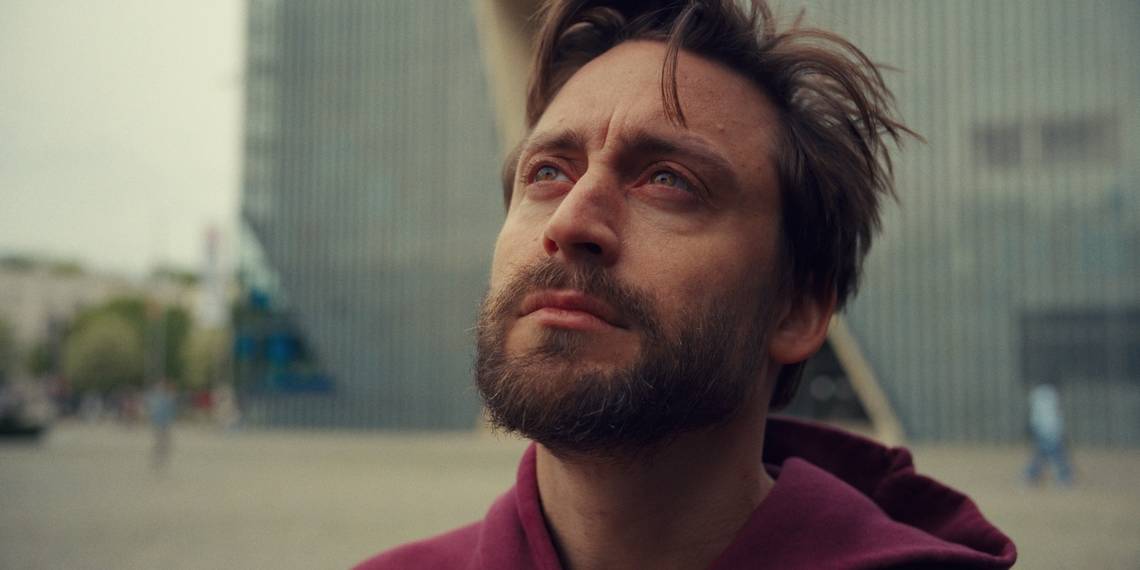
“A Real Pain” explores two contrasting approaches to suffering through the journey of cousins Dave (Jesse Eisenberg) and Benji (Kieran Culkin) in Poland. Eisenberg’s sophomore directorial effort presents a profound question: which approach truly represents “the real pain”? Is it more painful to forget or to remember, to adapt or to resist?
As the cousins travel through Poland to honor their Holocaust-survivor grandmother, they embody fundamentally different responses to their family’s history. David approaches life with measured restraint, viewing his suffering as nothing exceptional, while Benji experiences both joy and suffering with unfiltered intensity. This contrast evokes Nietzsche’s distinction between Apollonian and Dionysian forces – David representing rational order, Benji embodying passionate truth. David methodically manages his pain through medication and meditation, maintaining a stable family life and navigating social situations with careful decorum. Meanwhile, Benji refuses to compartmentalize, approaching life with emotional honesty that rejects rational explanations that might soften harsh realities.
David’s carefully constructed life appears functional, yet this containment exacts a profound cost. In one revealing rooftop scene, he tearfully confesses: “I would give anything to know what it feels like to have charm, to light up a room when I walk in.” This rare vulnerability exposes what David’s measured approach has denied him – the capacity for genuine connection and spontaneity that comes naturally to his cousin.
Benji’s magnetic charm draws people toward him even as his unfiltered critiques push them away. As David observes, he “lights up a room then shits on everything that’s inside.” This contradiction proves transformative – the tour guide evolves toward emotional authenticity following Benji’s criticism, and the entire group becomes more responsive at the concentration camp after witnessing his unguarded reactions. Yet catalyzing change in others, Benji remains resistant to transformation himself, using disruption as both weapon and shield – creating authentic moments while protecting himself from genuine connection.
The tension between transformation and stasis culminates when the cousins arrive at their grandmother’s house, only to find it “unremarkable.” After emotionally preparing to connect with their family’s traumatic past, they face only ordinary architecture. This underwhelming discovery reveals life’s fundamental absurdity: our search for meaning often leads to mundane reality rather than transcendent revelation. The cousins find no dramatic resolution – only the quiet realization that trauma’s legacy exists not in physical locations but in the psychological patterns we inherit.
Eisenberg’s circular narrative structure, bookending the film with airport scenes, underscores that while Benji catalyzes change in others, he remains caught in his own patterns. His refusal of David’s dinner invitation confirms his resistance to what he perceives as inauthentic engagement. These liminal airport spaces – neither here nor there – reflect Benji’s state of perpetual transition, embodying Nietzsche’s concept of “eternal recurrence” – how to live with the past without being crushed by it.
In this light, Benji’s behavior becomes an authentic response to suffering – like Camus’s Sisyphus, who finds meaning in pushing his boulder despite knowing it will roll back down, or like Nietzsche’s concept of “will to power” expressed not as domination but as the courage to face life on its own terms. The beauty of Eisenberg’s direction is that he doesn’t villainize either approach. David’s containment serves a purpose, just as Benji’s expressiveness does.
By the end, we’re left with not just a portrait of two different men, but a meditation on how all of us choose to carry – or set down – the burdens of our personal and collective histories, and whether, as Nietzsche might ask, we have the strength to bear the weight of eternal return while still embracing life’s full experience.